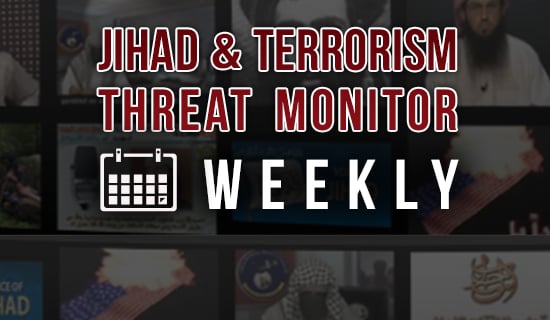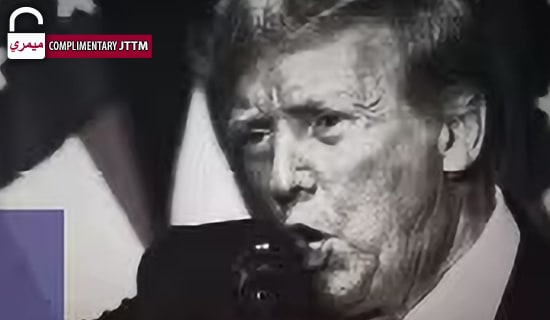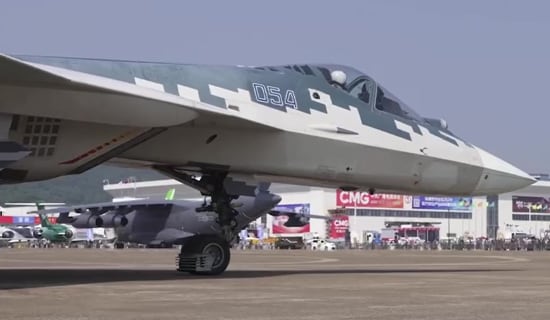Introduction
On April 23, 2021, customs authorities at the Saudi port of Jeddah announced that they had thwarted an attempt to smuggle drugs – mainly Captagon (fenethylline hydrochloride) pills, an amphetamine drug popular in the Middle East – in a shipment of pomegranates arriving from Lebanon. Subsequently, the Saudi Interior Ministry announced that beginning April 25, the country would accept no Lebanese imports of agricultural produce. The ministry added that it had previously warned Lebanese authorities about the increase in drug smuggling attempts from its territory, and that the ban would remain in force until the Lebanese authorities "provide satisfactory and documented guarantees that they have taken the necessary steps to stop the systematic smuggling against the kingdom."[1]
Addressing the increase in smuggling attempts from Lebanon to Saudi Arabia, Saudi Ambassador to Lebanon Walid Al-Boukhari tweeted that in the past six years over 600 million pills and hundreds of kilos of hashish from Lebanon had been seized by Saudi authorities, and that the drugs smuggled via this route during that time "could drown the entire Arab world, not just Saudi Arabia."[2] Additionally, Saudi Interior Minister Prince 'Abd Al-'Aziz bin Saud bin Naif tweeted that "the kingdom's security is a red line." [3]
The drugs seized at Jeddah port in a shipment of pomegranates from Lebanon on April 23. Al-Madina.com, Spa.gov.sa, April 23, 2021.
On their part, the Lebanese authorities hastened to condemn the drug smuggling from Lebanon, and stressed that they would step up their efforts to prevent further smuggling.[4] In an April 26 meeting convened by Lebanese President Michel 'Aoun, with Prime Minister Hassan Diab, ministers, and security and customs directors, 'Aoun stressed that Lebanon was working hard to maintain good relations with the Arab countries and to preserve these countries' security and stability. Also at the meeting, 'Aoun called on the country's security apparatuses to step up the fight against smuggling and those behind it,[5] and a series of measures for increased oversight of agricultural exports was put in place.[6]
As expected, the incident sparked widespread interest in Saudi Arabia. Although top Saudi government officials did not implicate any specific element in Lebanon for the drug shipment, the Saudi press published many articles and op-eds pointing at Hizbullah. Stating that Hizbullah was functioning as an organized crime network and had turned Lebanon into a base for waging direct war on Saudi Arabia, they added that the latest attempt to smuggle drugs into Saudi Arabia was one of many, and that the organization was acting to flood the kingdom with drugs in order to destroy it and bankroll its terror activity in the region.
There was also harsh criticism of Hizbullah in Lebanon, where journalists and politicians accused the organization and its political allies, including President 'Aoun, of responsibility for drug smuggling and its impact on the country's agriculture and economy, already in grave crisis. They accused the organization and the groups ruling Lebanon of bringing the country under occupation by Iran, of turning it into a hub for drug smuggling and terrorism, and of starving and weakening the Lebanese people. Some Lebanese politicians even defended the measures taken by the Saudis.
Hizbullah has not yet issued an official response, but articles published on its website and in the Al-Akbar daily, which is close to the organization, denied that Hizbullah was involved in smuggling drugs into Saudi Arabia. They also stressed that Saudi Arabia was falsely accusing Hizbullah in order to harm it and to bend Lebanon to its will. Another claim was that stopping Lebanese agricultural produce from entering Saudi Arabia was a purely political move, and that the Saudis were trying to starve the Lebanese people.
Charges that Hizbullah's activities are bankrolled by the drug trade are nothing new.[7] A U.S. Drug Enforcement Administration (DEA) task force has, since 2008, been monitoring a global syndicate created by Hizbullah, with an estimated annual profit of over $1 billion from drugs and weapons.[8] In recent years, massive shipments of drugs smuggled by ship from Syria and Lebanon have been seized across the Mediterranean basin and the Middle East. For example, in June 2020, Italian authorities apprehended a billion dollars' worth of Captagon arriving from Syria.[9] In light of this, and in light of the intense suspicion that Hizbullah was behind it, Hizbullah secretary-general Hassan Nasrallah, in a January 2021 speech, vehemently denied the accusations and clarified that any activity connected to drugs was forbidden by Islam and the penalty for it was death. He added that any operative found to be linked to drugs was immediately and permanently banned from the organization.[10]
In recent years, Syrian opposition websites have reported that Hizbullah is building a widespread drug manufacturing network that is smuggling its products into the Gulf and Mediterranean countries via the Syrian coast, with the cooperation, or at least the deliberate disregard, of Syrian President Bashar Al-Assad.[11]
This report will review reactions in Saudi Arabia and Lebanon to the news of Saudi authorities' April 23 seizure of a shipment of drugs from Lebanon.
The Saudi Press: For Years Now, The Terrorist Hizbullah Has Been Working To Flood Saudi Arabia With Drugs
Following the announcement about the thwarting of the drug smuggling attempt from Lebanon to Saudi Arabia, the Saudi press published numerous reports and articles accusing Hizbullah of being behind it. These reports and articles claimed that Hizbullah has been working for many years to smuggle drugs into Saudi Arabia, and that the recent incident is just one in a long series of similar attempts. They also claimed that Hizbullah's aim in doing this is to harm Saudi Arabia and its citizens and to finance its terror activities.
Saudi 'Okaz Daily: Nasrallah Is Leading Lebanon Into The Unknown Through Drugs, Terror And Money Laundering
On April 25, 2021, two days after the exposure of the smuggling attempt, the Saudi daily 'Okaz daily published an article headlined "Nasrallah Leading Lebanon into the Unknown," which stated: "The eyes [of the Saudi security forces] never close, they watch over the kingdom's security and thwart [the plots] of every aggressor. They thwarted the plot of the gangs of the terrorist Hizbullah, which is responsible, by means of its intermediaries, for most of the drug smuggling into Saudi Arabia…
"The terrorist Hizbullah has gained experience in smuggling drugs into the kingdom via neighboring countries, and lately has begun using several foreign and Muslim countries [to transport these shipments]. The capture of some 2.5 million amphetamine pills and 5.3 million Captagon pills from Lebanon is only one [in a series of] organized international smuggling attempts that passed through Lebanon and were aimed at destroying the achievements and the young people of the kingdom. Past investigations revealed that Hizbullah is involved in the drug trade, by means of its gangs. For this is one of the Hizbullah militia's main sources of funding, especially the trade in Captagon pills, which has brought millions of dollars into Hizbullah's coffers, comprising more than 70% of the organization's income…
The spokesperson for Saudi Arabia's General Administration for Drug Control, Muhammad Al-Najid, disclosed on an earlier occasion that the contraband concealed in Lebanese fruit and vegetable shipments constitutes 75% of all contraband confiscated in Saudi Arabia. He stressed that this activity is carried out by an organized crime network, whose prominent past operations included "[an attempt] to smuggle over 20 million amphetamine pills concealed in a shipment of grapes and over 4 million amphetamine pills concealed in a shipment of apples. An earlier report noted that 11 million amphetamine pills had been stashed in a shipment of tires that arrived in Jeddah from Lebanon."[12]
Saudi Lecturer: Hizbullah's Drug Smuggling – Organized Crime Threatening Saudi Arabia's National Security
'Abdallah Al-Assaf, a communications lecturer at Saudi Arabia's Al-Imam University, was quoted in an article in the Al-Riyadh daily as saying: "We must realize that the countries, militias and organizations that target us with drugs are the same ones that target us with terror, for the three legs of the triangle of evil – drugs, terror and money laundering – are inherently connected and their coordinated goal is to undermine our security and stability by weakening our economy and society and by facilitating the smuggling and spread of drugs among us. This trade, which is banned across the world, is the umbilical cord feeding the terrorist Hizbullah and its terrorist actions. The problem of drug smuggling from Lebanon to the kingdom has grown beyond 'isolated cases' and has become [a type of] organized crime that threatens Saudi Arabia's national security and the security of the [entire] region…"[13]
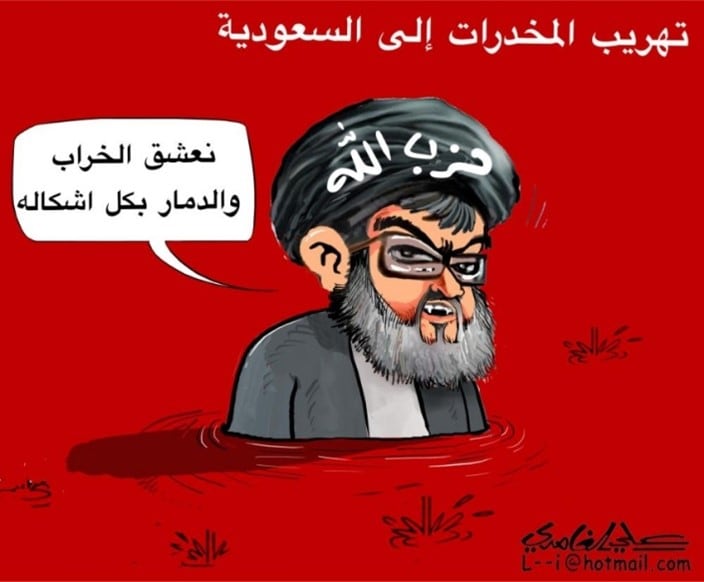
Cartoon in Saudi daily: "Hassan Nasrallah" says “We love destruction in all its forms”(Al-Madina, Saudi Arabia, April 27, 2021)
Saudi Columnist: Hizbullah Has Hijacked Lebanon And Transformed It Into A Base For A Direct War Against Saudi Arabia
In his column in the London-based Saudi daily Al-Sharq Al-Awsat, journalist 'Abdallah bin Bajad Al-'Otaibi claimed that Hizbullah and its allies, headed by President 'Aoun and his party, have transformed Lebanon into a base for a war against Saudi Arabia, which has harmed the Lebanese people, and that they will bear the responsibility for their deeds. He wrote: "Lebanon can no longer be regarded as a state… since reality clearly shows that it has been hijacked by Hizbullah, which is subordinate to Iran and [receives the] full backing of a Christian party [i.e. the Free Patriotic Movement founded by President Michel 'Aoun], which has seized the reins of government. These two elements [Hizbullah and the Free Patriotic Movement] do not care about the Lebanese state and its citizens, and consequently they will bear the responsibility for the result of any actions and activities against the countries of the region and the world…
"There is no need to prove that the Iranian regime is orchestrating an overt drug war against Saudi Arabia, for this is known to all. The world is well-acquainted with the Iranian drug-smuggling and drug-trade networks, and with Iran's use [of drugs] in its war against its rivals and in providing the necessary funds for itself and for its militias, such as the Lebanese Hizbullah, the Houthis in Yemen and other [militias]…
"The involvement of the Lebanese Hizbullah in the drug trade is likewise known to all the security apparatuses in America, Europe and the Arab countries. Hizbullah, which hides behind religious and sectarian [i.e., Shi'ite] slogans, makes use of religion and of the [Shi'ite] sect to professionally manufacture, smuggle and distribute drugs, [and] the Lebanese state, it turns out, grants Hizbullah full backing… The reality on the ground shows that the Lebanese state, which has been hijacked [by Hizbullah], can take no effective measures to deter this organization which has made a profession of drug trade and drug wars…
"For decades, Saudi Arabia has provided aid and support to the Lebanese people in very large sums, as part of the Saudi [policy] of promoting the stability of [other] countries and supporting [our] Arab brethren. But what has changed today is that Lebanon has become the base for a direct war against the Saudi government and people. No country in the world which gives top priority to the land and the people can ignore this [this type of warfare], in any shape or form. Those who forced [Saudi Arabia] to choose… between the interest of the Saudi people and the interest of the Lebanese people are the hijackers of the Lebanese state, whatever their partisan and [sectarian] affiliations. Therefore, the Lebanese people have the right to know about the injustice that is being perpetrated against them – both in the present and the future – by some of their leaders and [political] currents…"[14]
On social media as well, many Saudis attacked Hizbullah and asserted that it is attempting to harm Saudi Arabia. Saudi intellectual Turki Al-Hamad tweeted: "Stop it with all the fake slogans about 'resistance' [i.e., Hizbullah], whose greatest goal is ultimately to destroy Saudi Arabia using any possible means, including Lebanon's pomegranates, apples and persimmons, even if this requires collaborating with Israel. But Israel is several times more honorable than these drug smugglers."[15]
Saudi writer Muhammad Aal Shaikh even called to sever relations with Lebanon. He tweeted: "Hizbullah controls Lebanon and Lebanon is a failed state contaminated by drugs and terror, therefore we should sever relations with it, in every way."[16]

Muhammad Aal Shaikh's tweet
In Lebanon, Criticism Of Hizbullah: It Subjugates Us To Iranian Occupation, Rains Disasters Upon Us And Destroys Our Economy
Criticism of Hizbullah was also voiced by numerous politicians and journalists in Lebanon, who held it responsible for the drug smuggling and accused it of causing severe damage to the Lebanese economy and farmers, in light of the Saudi decision to ban the import of fruit and vegetables from Lebanon. Many of the Lebanese politicians accused Hizbullah of destroying the Lebanese economy and subjugating Lebanon to Iranian occupation.
Kataeb Party Chairman: There Is Anarchy On Our Borders; The Lebanese People Have Been Taken Hostage By Iran
Kataeb Party head Samy Al-Gemayel, a known Hizbullah opponent, criticized the smuggling attempt while hinting that Hizbullah is responsible for it, tweeting: "Look at the anarchy on the borders. The smuggling of goods and drugs will harm the Lebanese farmers, and all because of the decisions of the Captagon commanders [a reference to Hizbullah commanders]. We thank the mafia-militia alliance. The time to settle the score with you will come."[17]

Samy Al-Gemayels' tweet
In an interview with the Saudi Al Arabiya television channel, Al-Gemayel explicitly accused Hizbullah of smuggling drugs and claimed that it was done over official border crossings with the support of senior Lebanese officials. He added that "the Lebanese people have been taken hostage by a regime to which it has no connection," apparently referring to Iran.[18]
Lebanese Forces Party head Samir Geagea blamed the recent smuggling incident on President 'Aoun and his allies, i.e., Hizbullah. He wrote sarcastically: "A new achievement today for [our] strong president and his allies: they have managed to deprive the Lebanese farmers of a major and vital market for their produce. Members of this ruling group provide cover for an illegal trade, and the relevant security apparatuses do nothing, for well-known reasons [i.e., their loyalty to Hizbullah]. It has become clear that every day this ruling group and this 'strong' president continue [to control Lebanon] will bring [another] disaster upon the Lebanese. The failure of the group that currently rules [Lebanon] has become obvious and clear, as well as its corruption and its efforts to realize its purely personal interests at the expense of all Lebanese interests. We will have no salvation from these new daily disasters until we rid ourselves of this ruling group…"[19]
Senior journalist and former minister May Chidiac, known for her strong anti-Hizbullah opinions, addressed the organization in a tweet: "Haven't you grown tired of impoverishing the Lebanese people, starving it and closing the doors of the world to it[?]! Several days ago [Shi'ite cleric Sadeq] Al-Nabulsi, whom you have turned into your spokesperson, said that smuggling was a legitimate tool for the resistance![20]… The contraband [you smuggle] – is just one part of your crimes!"[21]
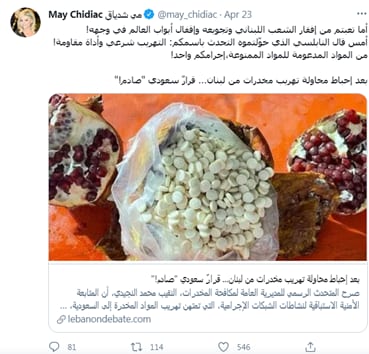
May Chidiac's Tweet
Lebanese Politicians: In The Service Of Iran, Hizbullah Has Transformed Lebanon Into A Base For Drug Smuggling And Into Hell
In an interview with the Saudi Al-Hadath channel, former MP Ahmad Fatafat blamed President 'Aoun and Hizbullah for the disaster that has befallen the Lebanese people. Claiming that "Lebanon is under Iranian occupation facilitated by Hizbullah" and that "Iran and its militias are using Lebanon as a platform for [their] smuggling [activities]," he even called Hizbullah Secretary General Nasrallah the "Lebanese Pablo Escobar," after the Columbian drug lord.[22]
Former Lebanese justice minister Ashraf Rifi told the Saudi daily Al-Riyadh that "Hizbullah has turned Lebanon from an Eden on the Mediterranean into Hell, [because] Lebanon has become a military camp for training terrorists and criminals and for smuggling drugs." He added that "Lebanon can no longer condone Hizbullah's terrorism and its organized crime [aimed at] exporting drugs to sister countries." Rifi expressed understanding for Saudi Arabia's decision to halt the import of produce from Lebanon, saying: "The Saudi decision is natural and meant to protect the security of the kingdom and the wellbeing of its citizens." Lebanon's security apparatuses, he added, are controlled by a political gang that conspires with Hizbullah against Lebanon and "supports Hizbullah's weapons and the control of its quasi-state over the Lebanese state." Therefore, he added, "Today we Lebanese have a golden opportunity to hand over South Lebanon and the defense of [our] land borders to UNIFIL, for the present government is unable to defend the borders, due to Hizbullah's control over its decisions." Rifi urged not to punish all the Lebanese people for Hizbullah's crimes, and called for "an Arab project to save Lebanon from the hegemony of Hizbullah, which is an arm of Iran."[23]
Hizbullah Has Crushed Lebanon's Economy And Agricultural Exports
Mustafa 'Aloush, an advisor to Sa'd Al-Hariri, also stated that the drug shipment intercepted by the Saudis was part of a conspiracy by Hizbullah, which controls Lebanon's land, sea and air borders. In an interview with the Saudi daily Al-Bilad, 'Aloush said: "Amid the deteriorating living conditions and economic situation in Lebanon, the export of produce to Saudi Arabia shored up the Lebanese economy. The terrorist party [i.e. Hizbullah] wants to harm the Lebanese economy with these despicable actions." Like Rifi, he too justified the Saudi ban on the import of Lebanese produce.[24]
Former MP Fares Sou'aid also blamed Hizbullah for the tremendous damage which will now befall the Lebanese economy and agriculture, tweeting: "You [Hizbullah] have crushed the export of Lebanese produce and destroyed the homes of the farmers. Remove the Iranian sponsorship from Lebanon."[25]
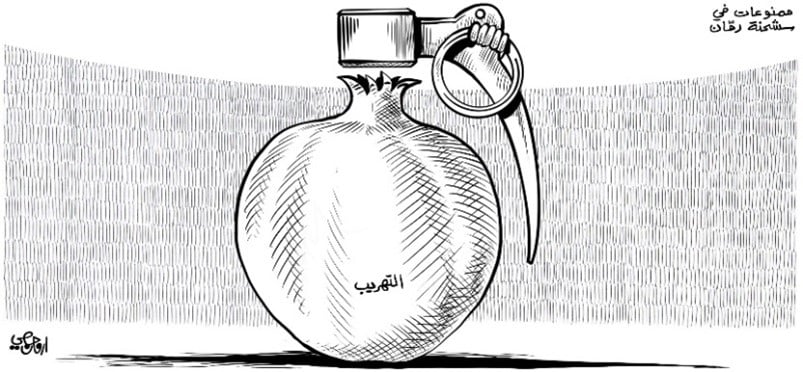
Cartoon in the Lebanese daily: "Contraband in a Shipment of Pomegranates" (Source: Al-Nahar, Lebanon, April 26, 2021)
Lebanese Shi'ite Journalist: Lebanon, Which Was The Region's Academic And Banking Center, Has Become Its Headquarters For Murderers And Smugglers
It should be noted that several Lebanese elements, among them politicians and representatives of the agricultural sector, stressed that the farmers in Lebanon have no connection to the drug smuggling even it is conducted across Lebanese territory. They accused Syrian elements of smuggling the drugs in trucks to Beirut port and from there to Saudi Arabia.[26] In an April 25 article on Asasmedia.com, Shi'ite journalist Nadim Koteich, a known opponent of Hizbullah, wrote that, even if this is the case, the responsibility belongs to the Lebanese authorities: "It doesn't matter if the shipment of drug-filled pomegranates that was sent to Saudi Arabia or to Athens originated in Lebanon or [only] passed through [the country]. The Lebanese authorities are equally responsible in both cases – especially since the involvement of Lebanon and of some of the most senior [figures] in its parties and security [apparatuses] in this issue [of drug smuggling] is a documented [fact]…
"Lebanon, once the region's medical, banking and academic center, has turned into a regional hub of smugglers, murderers and mercenaries, the headquarters of [the region's] militias and a club for training their members and fighters, under the management of the region's chief thug: Hizbullah… There is no need to repeat [what is said in] the detailed reports about Hizbullah's involvement in the drug trade and in running complex [drug trafficking] networks between South America and Africa. The examples are innumerable.
"There is someone who decides for the Lebanese what Lebanon's new role will be, following the systematic destruction of its previous role."[27]
Hizbullah In Response: The Saudi Drug Seizure – A Fabrication Intended To Punish Lebanon And Hizbullah
In articles published on its website and in papers close to it, Hizbullah rejected the accusations that it is behind the smuggling of drugs into Saudi Arabia, and claimed that the reports on the recent drug seizure are a cheap fabrication by Saudi Arabia aimed at harming Hizbullah and bringing Lebanon under Saudi control.
Hizbullah Website: The Alleged Drug Capture Was A Shallow Fabrication; Saudi Princes, Including Crown Prince Muhammad Bin Salman, Are Drug Users
Laila 'Amasha wrote on the Hizbullah website Al-'Ahed: "According to a UN report, Saudi Arabia tops the list of Middle East countries in terms of drug use. This is no secret, especially after it was proved that many of its princes have been involved in transporting drugs in their private planes and even abused drugs themselves. Videos have been circulated of [Saudi Crown Prince Muhammad] bin Salman in a state of light-headed confusion evidently induced by drugs – unless the foolishness of his words and gestures [in those video] is a natural state for him, rather than a temporary drug-induced [state].
"Hence, the claim of the Al-Sa'ud [royal] family, that it is fighting the [abuse], smuggling and selling of drugs, is absurd. But as part of the need to demonize Hizbullah and take radical measures to besiege Lebanon and punish it… [Saudi Arabia] had to stage a scene of intercepting a drug shipment from Lebanon – a shallow scene, like always, whose fabricated nature can be discerned without any need to investigate or search for evidence. Not to mention the fact that pomegranates are a fall fruit, which do not ripen at this time of year; that the shipment apparently passed through Lebanon [but did not originate there]; and that Greece strangely announced on the very same day that it had discovered another drug shipment from Lebanon in cooperation with Saudi Arabia…
"So the old-new signal was given, and pro-Saudi [Lebanese] elements hastened to parrot the [Saudi] announcement without making any effort to [avoid] insulting people's intelligence, not even the intelligence of their own supporters. They ignored the involvement of Saudi princes in cross-continental drug affairs, starting with the affair of spoiled Prince Captagon in Lebanon…[28]
"Had there been a wise man among them, [that man] would have shown some self-respect by adopting the principle of honorable rivalry and refusing to enter the murky quagmire of Saudi fabrications. A wise man knows very well that the shari'a law against using, distributing and trafficking drugs is a red line that Hizbullah would not cross under any circumstances…"[29]
The Pro-Hizbullah Al-Akhbar Daily: Saudi Arabia Has Declared War On Lebanon In Order To Subjugate It
Similar statements appeared also in an Al-Akhbar article, which read: "The Saudi war on Lebanon is becoming clearer. Either [Lebanon] will be subjugate [to Saudi Arabia], or it will cease to exist. This equation, established [by Saudi Crown Prince] Mohammed bin Salman, has begun to be implemented on the ground, by increasing the pressure [on Lebanon]. The ban on Lebanese agricultural imports is one manifestation of this pressure, if we disregard the [official] reason [given for the ban]... Thus, the famine in Lebanon has become a means of political pressure... If this weren't so, Riyadh would be implementing this measure [i.e. a ban on imports] also for other countries from which, according to Saudi customs data, more smuggled Captagon has been seized than from Lebanon...
"Everything that Saudi Arabia has been doing for a long time serves [its] aim of hobbling Lebanon and tightening the Arab and Western siege against it. Indeed, no Lebanese official, not even those close to the Saudis, believes that its decision [to ban agricultural imports from Lebanon] is connected to its efforts to protect Saudi society...
"The Saudis' most recent move... implies that the Saudi leadership has decided to declare war on Lebanon. It knows all too well that in light of [Lebanon's economic] collapse over the past year, Lebanon's exports are one of its sources of oxygen for its economy – and instead of helping Lebanon, it decided to suffocate it. Not only is the Saudi leadership looking on as the Lebanese starve to death as a result of the corrupt policy in Lebanon that it is aiding and abetting – it has even become one of the causes of this starvation..."[30]
*Z. Harel is a research fellow at MEMRI; H. Varulkar is Director of Research at MEMRI.
[1] Al-Madina (Saudi Arabia), April 24, 2021. It should be noted that the same day, Greece also announced that with Saudi assistance it had seized four tons of hashish at Piraeus port, hidden in a shipment of tools en route to Slovakia. Alhadath.net, April 23 2021.
[2] Twitter.com/bukhariwaleeed, April 25, 2021.
[3] Twitter.com/AbdulazizSNA, April 23, 2021. It should be noted that the Gulf states, including the UAE, Bahrain, Kuwait and even Qatar, expressed support for the Saudi measures against Lebanon. Al-Jumhouriya, (Lebanon), April 26, 2021.
[4] Al-Sharq Al-Awsat (London), April 24, 2021.
[5] Al-Jumhouriya (Lebanon), April 26, 2021.
[6] Al-Sharq Al-Awsat (London), April 27, 2021.
[7] See MEMRI Inquiry and Analysis No. 1227, Hizbullah's International Drug Network Preoccupies Europe, February 9, 2016.
[8] Politico.com/interactives/2017/obama-hezbollah-drug-trafficking-investigation.
[9] Bbc.com, January 9, 2021.
[10] Almanar.com.lb, January 9, 2021.
[11] Sasapost.com, January 18, 2020.
[12] 'Okaz (Saudi Arabia), April 25, 2021.
[13] Al-Riyadh (Saudi Arabia), April 25, 2021.
[14] Al-Sharq Al-Awsat (London), April 25, 2021.
[15] Twitter.com/TurkiHAlhamad1, April 24, 2021.
[16] Twitter.com/alshaikhmhmd, April 23, 2021.
[17] Twitter.com/samygemayel, April 23, 2021.
[18] Al-Liwa (Lebanon), April 26, 2021.
[19] Al-Nahar (Lebanon), April 24, 2021.
[20] On April 18, 2021 a video was circulated on social media in which Sadeq Al-Nabulsi, a Shi'ite sheikh close to Hizbullah, says that "smuggling is an inherent part of the resistance and the defense of Lebanon's interests. Today, under the current American pressure and sanctions, the Lebanese and Syrian peoples are forced to cross some lines and violate some laws in order to ensure their livelihood." The video is a segment from a France24 program on the smuggling activity on the Lebanon-Syria border, which has increased due to the sanctions on Syria. The video sparked intense reactions on social media, prompting Hizbullah to issue a response stating that Al-Nabulsi's statements were taken out of context and that he does not hold any official position in Hizbullah. Almodon.com, April 19, 2021.
[21] Twitter.com/may_chidiac, April 23, 2021.
[22] Kataeb.org, April 24, 2021.
[23] Al-Riyadh (Saudi Arabia), April 25, 2021.
[24] Al-Bilad (Saudi Arabia), April 25, 2021.
[25] Twitter.com/FaresSouaid, April 24, 2021.
[26] For example, the chairman of Lebanon's Farmers' Union in the Beqaa Valley, Ibrahim Al-Tarshishi, claimed that there aren't any locally-grown pomegranates in Lebanon to export, and that Lebanon imports them itself. According to him, the contraband and the drugs arrive in Syrian trucks which regularly enter Lebanon and unload merchandise at Beirut port, Al-Jumhouriya (Lebanon), April 23, 2021.
[27] Asasmedia.com, April 25, 2021.
[28] The reference is to Saudi Prince 'Abd Al-Muhsin bin Walid bin 'Abd Al-'Aziz, who was arrested in Lebanon in 2015 for drug smuggling and served a prison sentence in fairly comfortable conditions.
[29] Alahednews.com.lb, April 24, 2021.
[30] Al-Akhbar (Lebanon), April 26, 2021.


